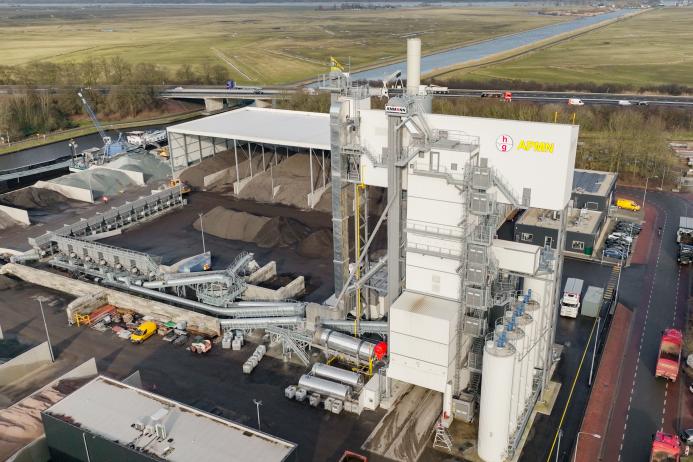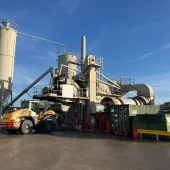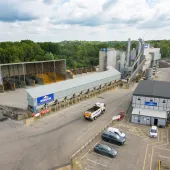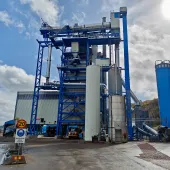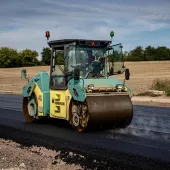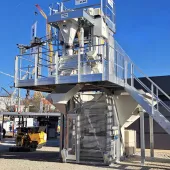New era for sustainable asphalt production
Six months of innovation and sustainability – the impact of new Ammann plant in Nijkerk, The Netherlands
SIX months after its grand inauguration by King Willem-Alexander, the Ammann ABP HRT 320 asphalt-mixing plant in Nijkerk has proven to be a game-changer for sustainable infrastructure in the Netherlands. Owned by Van Gelder Groep and operated by Asfalt Productie Midden Nederland (APMN), the plant is said to represent a new standard in environmentally responsible asphalt production.
In the last six months, the plant has also played its role in Van Gelder Groep achieving a significant financial milestone, with a notable increase in revenue compared with the previous year. This impressive growth highlights the strategic importance of the Nijkerk facility and its contribution to both sustainability and economic success.
The plant’s advanced RAH-100 recycling technology allows for recycling rates of up to 100%, with Van Gelder achieving certification to produce also top layers with up to 65% recycled materials. These achievements translate into a 40% reduction in CO2 emissions, positioning the company at the forefront of eco-friendly infrastructure development.
Beyond its financial success, the plant is also setting new benchmarks in efficiency and future sustainability. The Ammann plant’s modular design ensures adaptability for future sustainable fuel sources, including hydrogen, whilst its production process with Ammann foam allows asphalt to be produced at lower temperatures (130ºC–140ºC instead of the conventional 180ºC). This results in significant energy savings and reduced emissions. Additionally, the Ammann plant can produce up to 100% bio-based recycled asphalt, marking another major step toward reducing waste and emissions in infrastructure projects.
To streamline operations and enhance efficiency, the plant features a 1,000-tonne ready-mix storage capacity, divided into 10 chambers with double loading doors. This design enables rapid loading without truck repositioning, significantly reducing operational delays. The plant’s enclosed mixing tower and covered storage for processed asphalt granulate also minimize environmental impact.
A major factor in the plant’s success is the state-of-the-art Ammann as1 control system, which provides seamless operation and maximizes production efficiency. The system integrates automation tools that enhance production efficiency and quality control.
Key Features of the installed as1 Control System include:
Dynamic Recycling Addition (RAD) – Automatically adjusts recycling rates based on material quality and grade lines, ensuring consistent mix properties while optimizing the use of recycled materials
EcoView Energy Monitoring – Tracks and analyses energy consumption, helping operators identify areas for efficiency improvements and cost savings
Peak Load Management (PLM) – Continuously monitors peak performance against critical values and predicts peak fee times to optimize energy usage and reduce costs
Wheel Loader Terminal – Displays essential real-time data to the wheel loader driver, reducing the need for communication with plant operators and increasing efficiency
as1 PIP – Provides production insights and plant status details, allowing staff to anticipate potential issues, optimize scheduling, and enhance overall efficiency
as1 Loadout System – Ensures accurate asphalt loading with minimal manual intervention, increasing efficiency and reducing errors.
With these intelligent automation tools, the Nijkerk plant can precisely control production parameters, minimizing waste and maximizing resource efficiency.
The facility’s on-site laboratory plays a key role in innovation, offering real-time monitoring and quality control through an Ammann as1 Laboratory workstation. The lab supports research into new asphalt formulations, including quieter and more durable road surfaces, advancing the sustainability and effectiveness of the final product.
Additionally, the plant’s aggregate storage silos are highly insulated to prevent heat loss and ensure that materials maintain the correct temperature for extended periods.
Looking ahead, the Nijkerk plant is poised for even greater advancements in sustainable asphalt production. Plans to install 3,000 solar panels on site will further reduce the facility’s carbon footprint, reinforcing Van Gelder’s long-term commitment to green energy solutions.
With an annual production capacity of up to 450,000 tonnes of asphalt, the plant has exceeded expectations in its first six months, proving itself as a model for future-ready, sustainable asphalt production.

